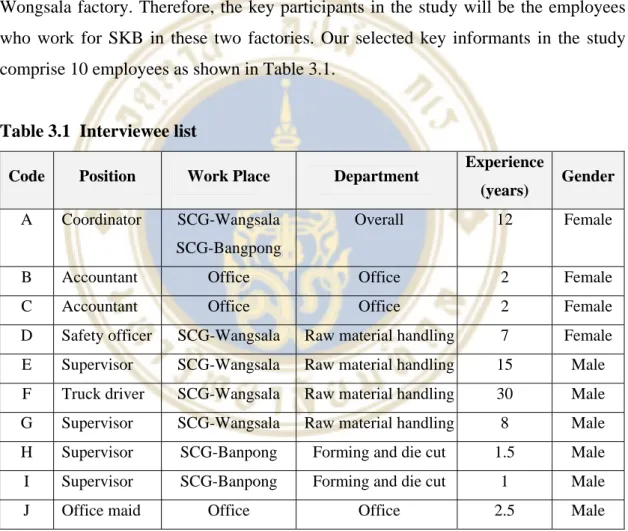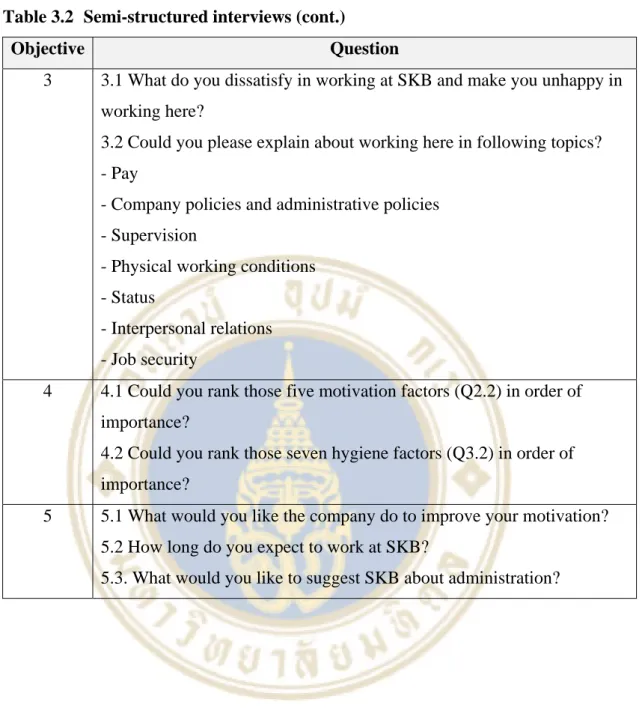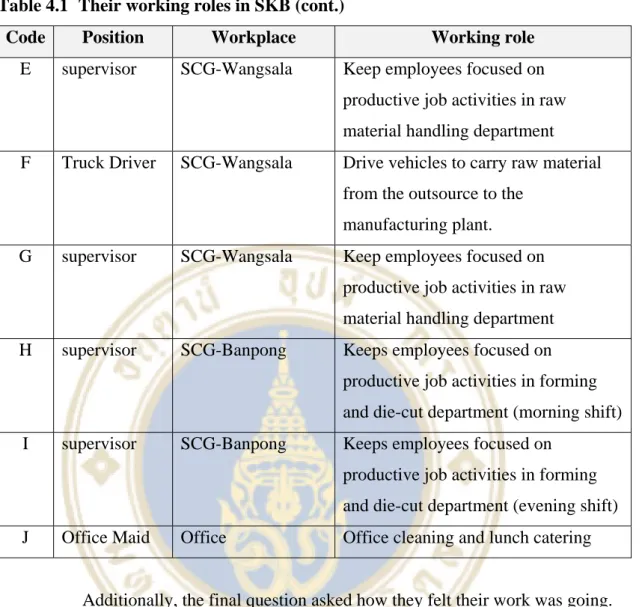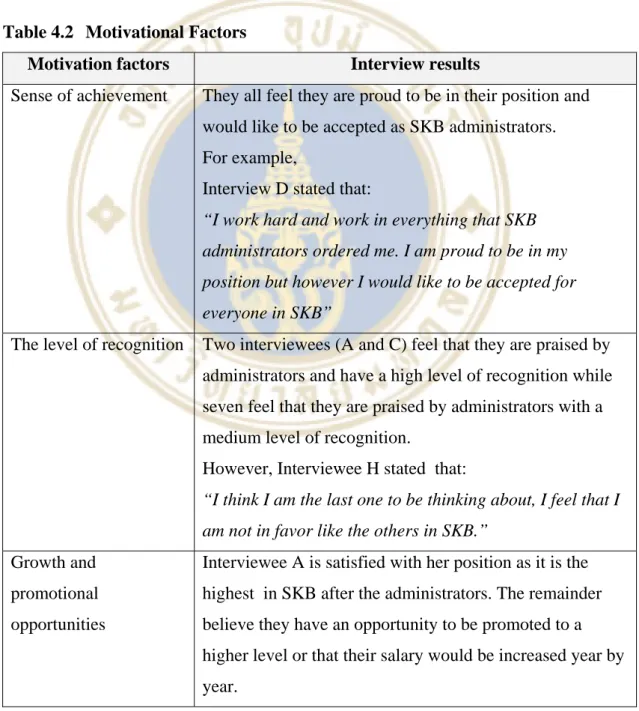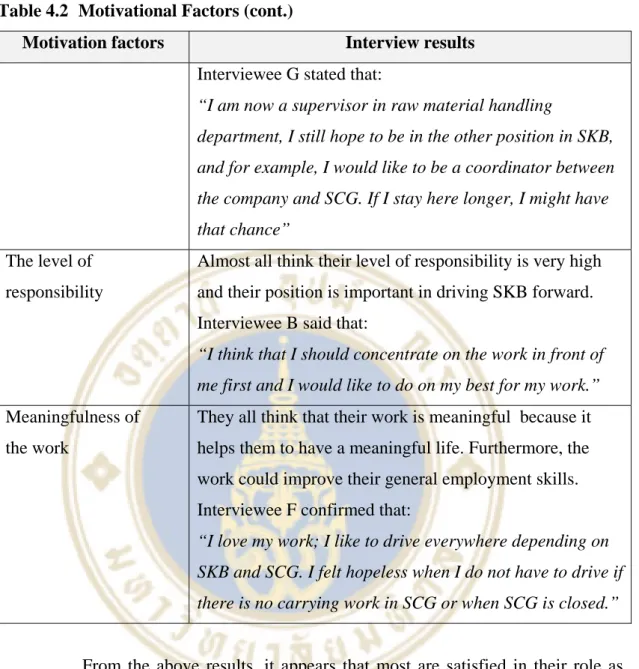Astrid Kainzbauer, and would like to thank her for her excellent guidance, support, encouragement and patience. Finally, I would like to thank my parents and my wife for their endless love, understanding and spiritual support during my studies. The purpose of this research is to focus on motivation, satisfaction and the impact they have on employee loyalty to SKB.
In this study, employees would like SKB to increase welfare and reward good employees to encourage them. Almost all agreed to stay in SKB as they are aware of the permanence of the position and the administrator's friendliness. Managers are to some extent responsible for the success of business companies, but the most important drivers of success are the company's employees.
The company has fewer problems if the turnover rate is low, as it shows that employees have a high level of loyalty to the company. To prevent dedicated and talented employees from leaving the company, they must be retained. Unfortunately, SKB has had a high turnover rate in recent years which has caused several problems for the company.
The aim of this study is to focus on motivation, satisfaction and the impact it has on the loyalty of employees to SKB.
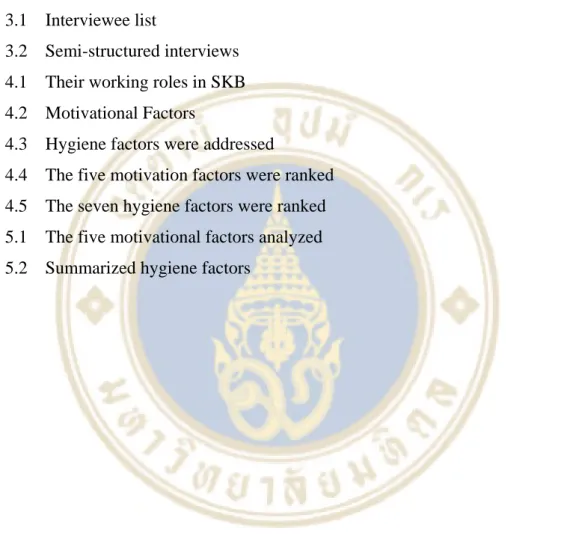
LITERATURE REVIEW
- Motivation
- Job satisfaction
- Loyalty
- Conclusion
In combination with sufficient competence and insight into the job, a person can be very productive. Meaningfulness of the work - The work itself must be meaningful, interesting and challenging for the employee to perform and be motivated. Interpersonal relationships - the employee's relationship with his/her colleagues, superiors and subordinates must be acceptable and appropriate.
Locke (1976) defined job satisfaction as an emotional state resulting from the evaluation or appreciation of one's work experience. Spector (1997:2) argued that job satisfaction is simply the way people feel about their job and its various aspects. Job satisfaction is simply about whether employees like (satisfaction) or dislike (dissatisfaction) their job.
Furthermore, job satisfaction was an attitudinal variable and could be viewed as an overall feeling about the job or as a related constellation of attitudes about different aspects or facets of the job. Bateman and Snell claimed that if people felt treated fairly as a result of the results they received, they would be satisfied. Thus, different work outcomes arise from different opinions, and these are responsible for different levels of job satisfaction.
Gupta and Gokhale (2013) suggested that job satisfaction could be divided into two types, affective job satisfaction and cognitive job satisfaction, and these determine how well an employee fits either the job or the organization. Some researchers believe that job satisfaction is simply a feeling people have about work that they like or dislike, or a related constellation of attitudes toward various aspects or facets of the job, such as the nature of the work or supervision. Others suggest that job satisfaction is less simplistic than this, and that multidimensional psychological responses to one's job are involved.
Regarding the workplace, Antoncic and Antoncic (2011) suggested that "employee loyalty exists in a company when employees believe in the company's goals, accept the goals as their own, work for the common good, and want to stay with the company." As shown in Chapter 1, one of the objectives of this study is to investigate the motivational factors associated with employee loyalty. Motivational and hygiene factors will be used in the second and third objectives of the study, as both aim to investigate the relationship of these factors to job satisfaction among SKB employees.
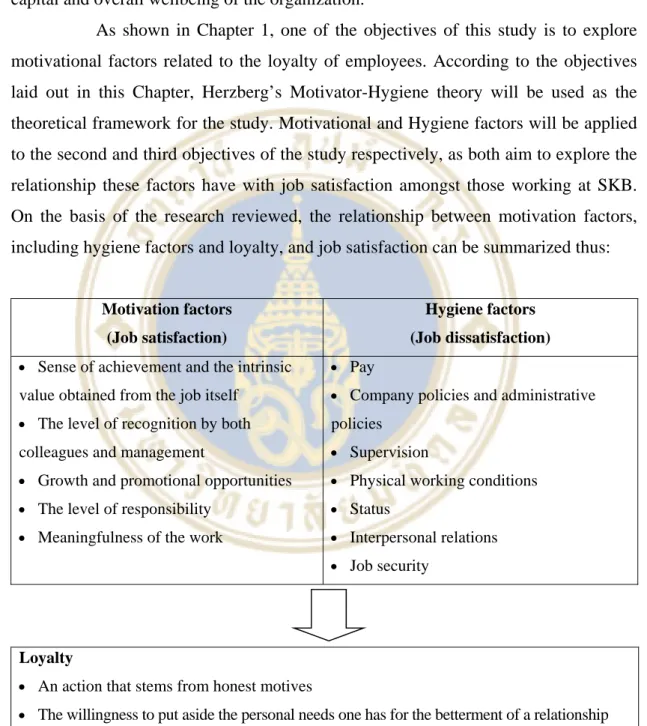
METHODOLOGY
Qualitative Approach
Instrument of the study
- Data Collection
- Semi-structured interviews
Oppenheim (2000) suggested that every effort should be made to encourage interviewees to express their ideas spontaneously and in their own words. A good in-depth interview looks naturalistic and resembles everyday conversation (Legard et al., 2003). For in-depth interviews, we have prepared an interview guide containing open-ended questions.
There were five main groups of open-ended questions that reflected the objectives of this research. 2 2.1 What makes you happy about working at SKB and makes you happy. 3 3.1 What are you dissatisfied with when working at SKB and what makes you dissatisfied when working here.
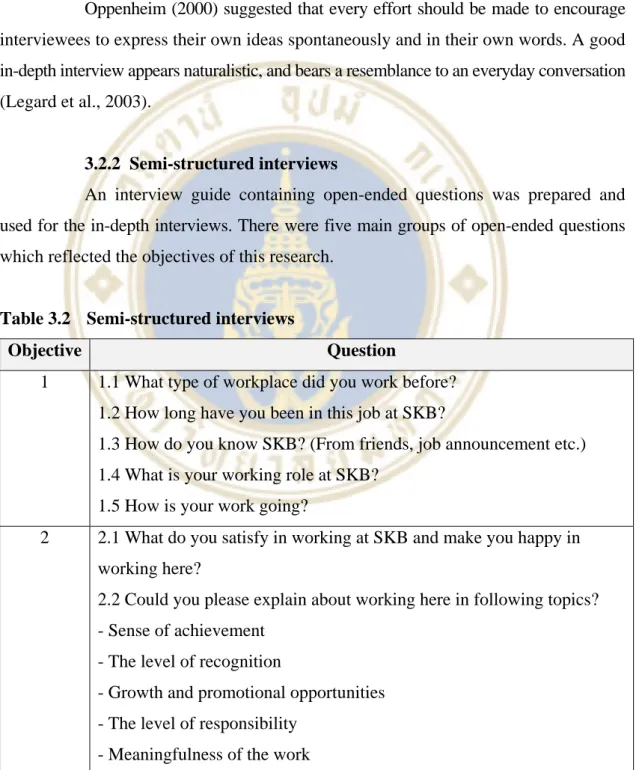
DATA ANALYSIS
- Background and characteristics of working in SKB
- Motivational factors in working at SKB
- Hygiene Factors Relating to Working at SKB
- Motivational Factors Related to Employees’ Loyalty Towards SKB Two questions addressed the fourth objective: motivational factors of
- A good solution to retain the employees in SKB
G and I used to work in the warehouse while J used to work in a Vita food fruit factory. I think that the work is difficult, as I have to do with many people in SKB and SCG. Employees of SKB are not very difficult to deal with because I have known them for a long time and now I know how to control them or order them to work in specific tasks.
The work is challenging and interesting, but turbulent and working in the department requires time to understand the work role.” Working as an accountant needs enough time to learn the salary calculation system and at some point, if a work system changed quickly, we have to adapt to the work in the limited time. So they would not find working at SKB that difficult compared to previous workplaces.
Most came to work at the company as a result of suggestions from friends rather than seeing the job ad. I am proud to be in my position, but I would still like to be accepted by everyone at SKB". I think I am the last one to think of, I feel that I am not too like the others in SKB.”.
Interviewee A is satisfied with her position as she is the highest in SKB after the administrators. Now I am a supervisor in the raw material handling department, I still hope to be in the next position in SKB, and for example, I would like to be a coordinator between the company and SCG. When asked about motivational factors, they all felt motivated and hoped to be promoted in the future.
Even though my status is not a very high level in the company, but I feel acceptable here because every employee is respectful”. From the above results, interviewees rated the three most important motivational factors as being: growth and promotion opportunities (average 3.6), the level of recognition (average 3.3) and sense of achievement (average 3.2). Three questions addressed the final goal: to find a good solution that would help retain the employees in SKB.
The company should increase extra money and special welfare for some positions in the company, for example, accountants in the office." Two interviewees (B and C) would like to have better equipment in the office, for example, printers and scanners, because there is not enough for everyone .
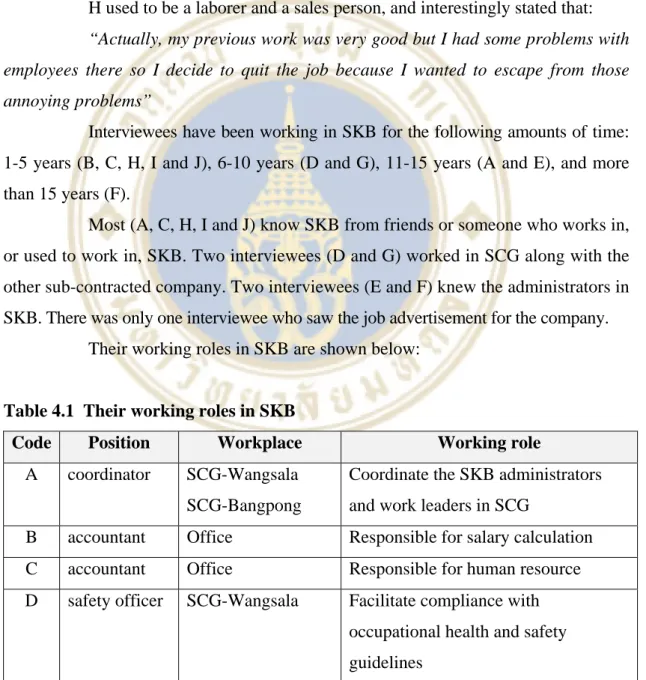
CONCLUSION AND RECOMMENDATION
Conclusion
Sense of achievement Proud to be in their position and need acceptance from SKB administrators. The level of responsibility Very high in the company and important to drive SKB forward. Hygiene factor related to physical working conditions rather than the administrative system of the company.
The employees would like to see SKB improve in certain areas. They are all satisfied with the current situation, but would like to see the salary increased or a bonus added. They are therefore loyal to SKB, in line with Antoncic and Antoncic's (2011) assertion that employee loyalty in the company exists when employees believe in the company's objectives, accept them as their own, work for the common good and want to stay with the company. Company. Almost everyone agreed to stay at SKB because they are aware of the sustainability of the job and the friendliness of the administrator.
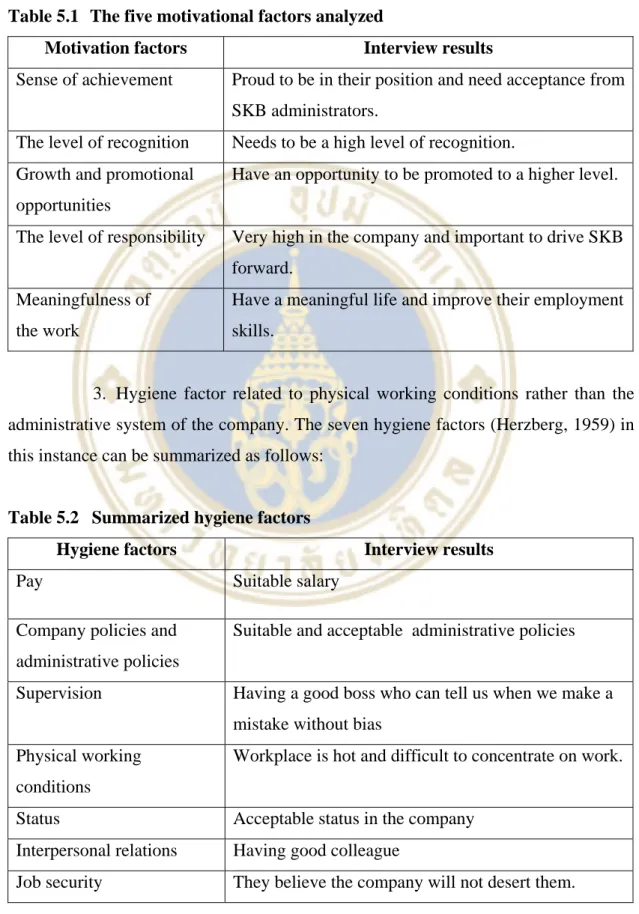
Recommendations
Limitations of the study
Although the researcher asked them to tell the truth, they may have been reluctant to mention any problems because they were worried about job security.

